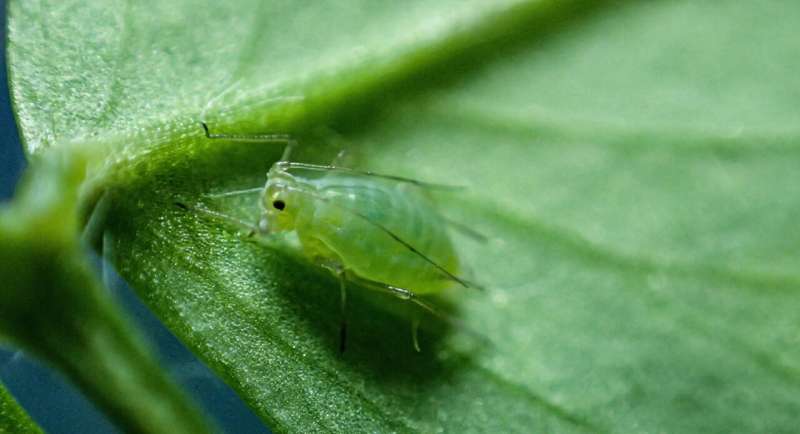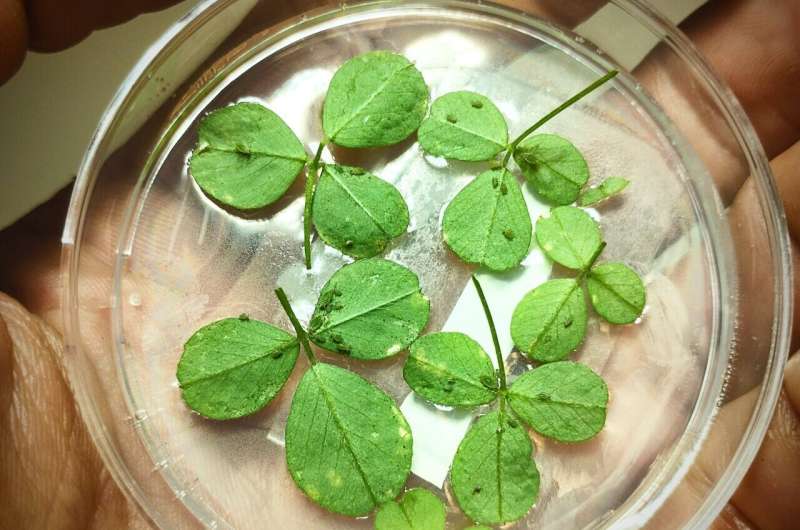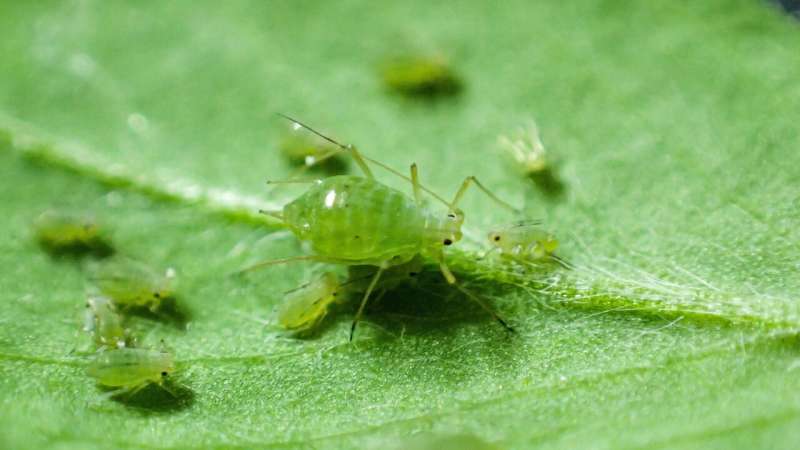
For the first time, researchers in Australia have documented insecticide resistance in field-collected populations of bluegreen aphids, Acyrthosiphon kondoi—a worldwide pest of pulses and other legume crops.
The study, published in Pest Management Science, serves as a warning to growers globally and highlights the need for new strategies to manage this pervasive pest.
Evatt Chirgwin, evolutionary biologist at Cesar Australia and corresponding author of the study, explained that the research was prompted by reports of conventional insecticides failing to control A. kondoi populations.
“Our primary motivation was to help Australian growers understand an emerging pest management challenge,” said Chirgwin. “Australian growers have traditionally relied upon two types of insecticides (organophosphate and carbamates) to protect their legume crops from A. kondoi. However, in recent years, multiple growers in Southern Australia reported these insecticide sprays were no longer controlling A. kondoi, which indicated this pest may have evolved insecticide resistance for the first time.”
A. kondoi is an agricultural pest in the U.S., South America, Asia, Europe, Africa and Australia. Chirgwin explained that they damage crops by feeding on upper leaves, stems, and terminal buds. “A. kondoi also causes indirect damage by spreading plant viruses, including cucumber mosaic virus and bean yellow mosaic virus,” he noted.

The team collected A. kondoi populations from lentil and alfalfa paddocks where insecticide control failures have recently been reported across Victoria, South Australia, and New South Wales. The populations were exposed to different insecticides in bioassays, revealing moderate resistance to three insecticide groups: organophosphates, carbamates, and pyrethroids.
Explaining the impact of resistance at this level to Australian growers, Chirgwin said, “On a practical level, growers cannot rely on organophosphates and carbamates (at the registered rate) to confidently control these newly evolved A. kondoi populations. Still, the low-to-moderate levels (20-40 fold) of resistance shown by A. kondoi in this study is less than some other aphid species (i.e., >100 fold) have been able to evolve to these chemicals.”
Chirgwin noted that the discovery of pyrethroid-resistant A. kondoi populations was unexpected—the use of pyrethroids to control A. kondoi in Australia is relatively restricted and therefore the authors did not think the insects would be under enough selection pressure to evolve resistance.
“We now suspect that A. kondoi populations are regularly exposed to pyrethroid-based insecticides because this chemical is widely used in pulse and pasture seed crops to control other pests (e.g. mirids, Helicoverpa, and other aphids) that often occur alongside A. kondoi,” he explained.
The researchers found no evidence of resistance to another insecticide—flupyradifurone. This was unsurprising given the chemical was only introduced into the Australian market in 2016 and is not registered against A. kondoi in the country.

The authors conclude that flupyradifurone may, therefore, provide a new chemical option for A. kondoi control in Australia, Chirgwin provided a note of caution and stressed the importance of integrated pest management strategies to restrict the emergence of further cases of insecticide resistance:
“If registered, flupyradifurone should only provide one part of the A. kondoi management strategy in Australia. Overreliance on one (or a small number of) insecticides will place A. kondoi populations under consistent and strong selection pressure that favors increased resistance to evolve.”
“Rotating between different types of insecticides can help ease the selection pressure placed on pest populations. As such, growers require multiple chemical options to rotate between for A. kondoi control and for these chemicals to be available at an economical rate.”
“Greater support of non-chemical control options can also provide alternative avenues to manage A. kondoi and reduce selection for insecticide resistance. Natural enemies (e.g., ladybirds & parasitoid wasps) provide an effective biocontrol option for many aphids. Alternatively, growers may use some crops (e.g., medics) where cultivars have been bred with plant resistance to aphid feeding.”
“More novel endosymbionts (a type of bacteria hosted by many animals) have revolutionized how some mosquito disease vectors are managed, and similar endosymbiont-based interventions are currently being researched as a new avenue to manage agricultural pests.”
“We are attempting to map where insecticide-resistant populations of A. kondoi have spread so we can provide growers with more regionally specific management recommendations. We are also exploring what naturally occurring biocontrol options available for this pest and how endosymbionts can offer a new avenue to mitigate the damage this pest causes to crops,” noted Chirgwin.
More information:
Evatt Chirgwin et al, Discovery of insecticide resistance in field‐collected populations of the aphid pest, Acyrthosiphon kondoi Shinji, Pest Management Science (2023). DOI: 10.1002/ps.7864
Provided by
Society of Chemical Industry
Citation:
Researchers warn of global threat to crops as insecticide resistance emerges in bluegreen aphids (2024, January 17)
retrieved 17 January 2024
from https://phys.org/news/2024-01-global-threat-crops-insecticide-resistance.html
This document is subject to copyright. Apart from any fair dealing for the purpose of private study or research, no
part may be reproduced without the written permission. The content is provided for information purposes only.







